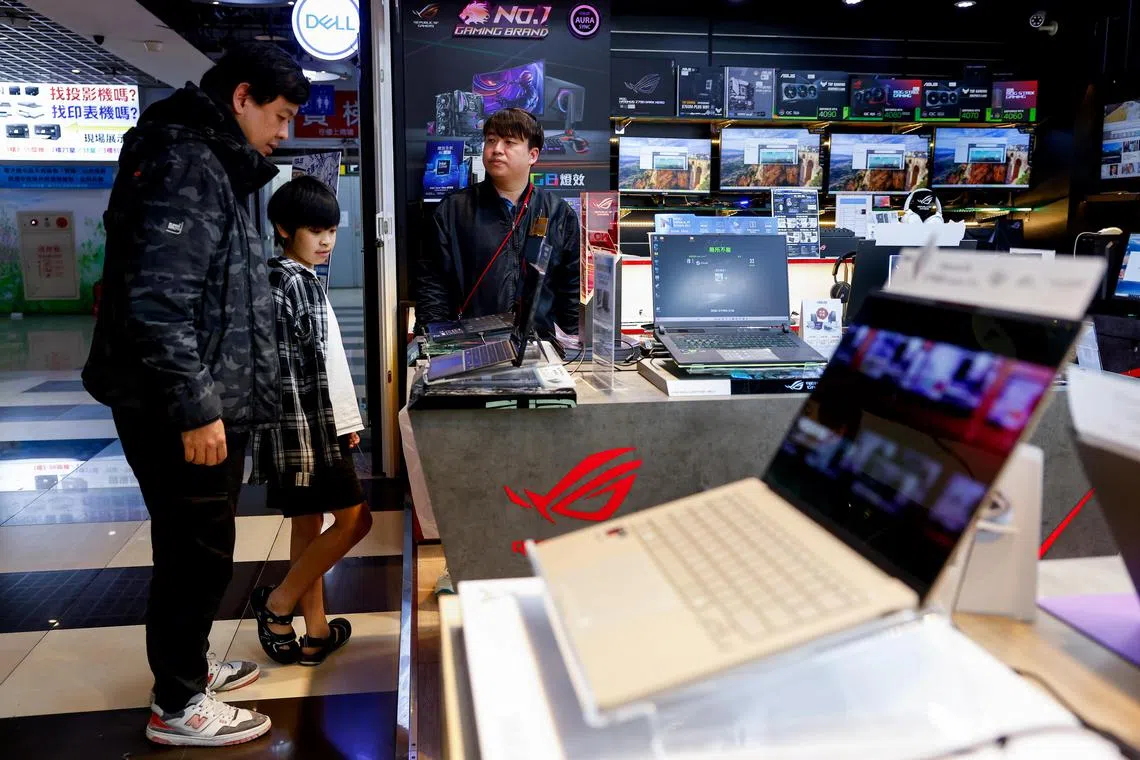News analysis
‘Unreasonable’ Trump tariffs on Taiwan could fuel scepticism of US
Sign up now: Get insights on Asia's fast-moving developments

The higher-than-expected tariffs could further fuel what is known as yi mei lun, or “America scepticism”.
PHOTO: REUTERS
TAIPEI – In the end, US$100 billion (S$133 billion) was not enough.
The investment by Taiwan’s top chipmaker in Arizona, announced on March 4, is expected to create 40,000 jobs and was lauded by US President Donald Trump as “tremendous”.
The fresh commitment, which would bring Taiwan Semiconductor Manufacturing Company’s (TSMC) total investment in the US to US$165 billion, was widely seen as being sufficient in inoculating the island from his would-be tariffs.
One month on, that proved to be a vain hope.
On April 2, Mr Trump said Taiwan would be subject to a tariff of 32 per cent
“From Taipei’s point of view, this outcome stings,” said Professor Julien Chaisse, an international trade expert at City University of Hong Kong.
“I believe that officials had hoped that goodwill gestures, like the scale of TSMC’s commitment in the United States, would carry weight in Washington,” he told The Straits Times.
The higher-than-expected tariffs could further fuel what is known as yi mei lun – the “America scepticism” narrative that questions the reliability of the US as a trusty security partner for Taiwan.
It is mostly spread by pro-Beijing players in Taiwan and disinformation campaigns from China. But Mr Trump’s transactional foreign policy has added to the sense of unease that the US may ultimately leave the island hanging in the balance in the event of a Chinese invasion.
Lawmaker Chiu Chih-wei of the ruling Democratic Progressive Party (DPP), a member of the legislature’s economics committee, told reporters on April 3 that Taiwan has been an important partner in helping Washington contain China economically.
However, the “simplistic way” in which the US views its trade relationship with Taiwan – only in terms of trade deficit – “would give ‘America sceptics’ and domestic divisive forces the opportunity to take advantage of the situation” to fuel doubt, he said.
On April 3, Taiwan’s main opposition, the Beijing-friendly Kuomintang, said President Lai Ching-te “has been blindly leaning towards the US” and has shown that he has no bargaining chip in negotiations with Mr Trump.
“This just shows that Taiwan cannot rely entirely on the US,” its statement read.
Taipei sees Washington as its most important security backer against China, which claims the island as its territory and has in recent years ratcheted up military, diplomatic and economic pressure on it.
Under the leadership of the DPP, Taiwan has sought to foster warmer ties with Washington amid heightened cross-strait tensions. Beijing has a particular distrust of Mr Lai and has repeatedly labelled him a “dangerous separatist”.
On April 3, Taiwan’s Cabinet condemned the “unreasonable” US tariffs, adding that it was unclear how Washington calculated the figure.
“It is unfair to Taiwan,” said Cabinet spokeswoman Lee Hui-chih in a statement.
She partly blamed Mr Trump’s tech curbs on China during his first term from 2017 to 2021 for driving the trade imbalance between the US and Taiwan.
In 2024, Taiwan’s trade surplus with the US surged 83 per cent from the year before, with exports to the US hitting a record US$111.4 billion, driven by demand for high-tech products such as semiconductors.
“Taiwanese companies’ supply chains had relocated back to Taiwan (from China), while the US has increased its demand for Taiwan’s information and communications products,” added Ms Lee. “This reflects Taiwan’s huge contribution to the US’ economy and national security, but now Taiwan has been subjected to high tariffs.”
The new tariffs do not apply to semiconductors, but the measure will deal a heavy blow to other tech industry players.
In 2024, Taiwan’s top export to the US was computers and related parts, which reached US$51.49 billion, representing a 140.29 per cent increase year-on-year.
Professor Darson Chiu, an economist at Taiwan’s Tunghai University, noted how Mr Trump’s other tariff measures will also have a tremendous impact on Taiwanese companies, especially those with a presence in South-east Asia.
With encouragement from the government, Taiwanese firms have in recent years moved manufacturing to countries such as Vietnam and Thailand, as part of a trend to diversify from China.
But the US has also slapped heavy duties on those countries, subjecting Thailand to tariffs of 36 per cent and Vietnam to duties of 46 per cent.

The new tariffs do not apply to semiconductors, but the measure will deal a heavy blow to other Taiwanese tech players.
PHOTO: REUTERS
“There is no safe place (for Taiwanese companies) to do business,” said Prof Chiu.
Prof Chaisse is more optimistic, saying that while Taiwan has limited options at this point, it is not helpless.
“One priority will be to press harder for concrete trade agreements with partners that offer more predictability. The stalled talks with the European Union are now likely to get renewed attention, and so will efforts to deepen economic ties with Japan, Canada and Asean markets,” he added.
But Taipei has to do all this while continuing to carefully manage ties with the US, he said.
“Taiwan cannot afford to alienate Washington, especially as US-China relations continue to harden. The best it can do, for now, is signal reliability and openness, while working quietly behind the scenes to mitigate the damage.”
For now, Mr Lai said the government would continue to communicate with the US to protect Taiwanese interests, and pledged to support local businesses.
“I’ve instructed the Premier to provide the public with the government’s response plan to the tariffs as soon as possible, and to maintain close contact with local businesses and provide them with maximum support,” he wrote in a Facebook post.
Yip Wai Yee is The Straits Times’ Taiwan correspondent covering political, socio-cultural and economic issues from Taipei.



